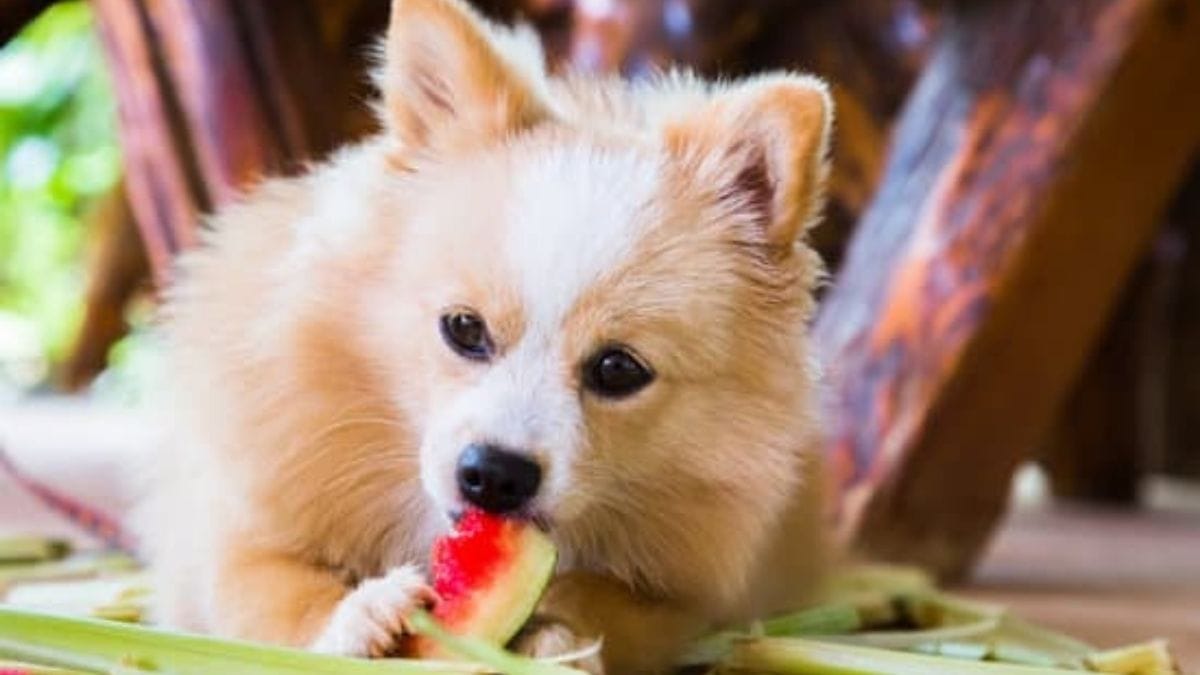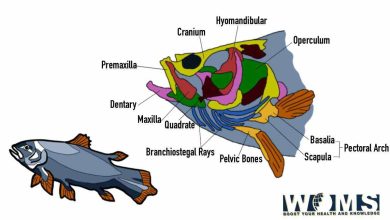Can Dogs Eat Watermelon?

Can dogs eat watermelon? Dogs can eat watermelon in a nutshell. But there are a few things you should know before giving this delightful treat to your dog. For dogs eating watermelon, there’s nothing to be concerned about, whether you’re searching for a nutritious treat to share with your four-legged buddy on a hot summer day or you unintentionally left a dish of fresh watermelon within reach of your dog.
What are the advantages of watermelon for dogs? The fruit is a nutritional powerhouse, low in calories and high in vitamins A, B6, and C, as well as potassium. Furthermore, the fruit contains only approximately 50 calories per cup and comprises 92 percent water, making it ideal for hydration on a hot day. It’s also low in fat and cholesterol, so you can eat it guilt-free.
However, Watermelon rinds and seeds can create major health problems if consumed in excess. It’s critical to understand how to serve it to your dog so that they do not become ill. Before giving your dog human foods, including watermelon, you should always consult your veterinarian. Here’s all you need to know about giving your dog watermelon.
Can Dogs Eat Watermelon?
Watermelon is high in potassium and vitamins A, B6, and C, all of which are excellent for dogs’ health. It also contains a lot of fiber, which aids digestion. Although watermelon includes sugar, the fruit’s fiber component insulates the sugar, preventing it from being released too quickly into the bloodstream. It also contains lycopene, an antioxidant that may aid in cancer prevention.
Furthermore, Watermelon is minimal in calories, salt, fat, and cholesterol, making it a better alternative to many store-bought snacks. This fruit, which comprises roughly 92 percent water, can be a fantastic source of hydration and a refreshing treat on a hot day. Therefore posing this question can dogs eat watermelon? and also do you have any idea why do dogs eat grass?
Can dogs eat watermelon? How to Feed Watermelon to a Dog?
Watermelon should be eaten in moderation to your dog, just like any other treatment given besides their usual balanced diet. We can feed watermelon to dogs in a variety of ways, all of which are safe:
- In bite-size pieces: Remove the rinds and seeds from the watermelon before slicing it.
- Frozen chunks: Freeze the fruit after removing the rinds and seeds, then serve on a hot summer day. The reward will assist in the cooling down of your dog!
- After removing the seeds and rinds from the fresh fruit, puree it and freeze it in an ice cube tray.
- Blend frozen watermelon pieces with plain, unsweetened yogurt to make watermelon ice cream. Place on top of your dog’s food bowl or insert into a Kong-style rubber toy. Plain yogurt is okay to consume for most dogs unless they have lactose intolerance. It’s usually more tolerable than ice cream, and yogurt’s bacterial cultures are beneficial to gut health. Simply select plain yogurt free of added flavors, fruit, sugars, natural sweeteners, or artificial sweeteners. Make sure the product does not contain harmful xylitol by reading the label carefully.
What Fruits Can Dogs Eat Besides Watermelon?
While watermelon is one of the greatest human meals to share with your dog, there is a range of other fruits that are safe (and not so safe!) for dogs to eat. Only feed your dog human food in moderation, as well-balanced, healthy dog food should provide them with most of their nutrients.
Fruits that are Safe for Dogs
- Cucumber
- Blueberries
- Strawberries
- Oranges are a delicious fruit (peeled only in small amounts)
- Tangerines are a type of citrus fruit (peeled, only in small amounts)
- Mangosteen (remove the pit and cut up into small pieces)
- Peaches is a delicious fruit (pit removed)
- Raspberries
- Cranberries
- Bananas are a fruit (remove the peel)
- Pineapple is a tropical fruit (high in sugar, so small amounts)
- Apples are a fruit that grows on trees (remove the seeds and core)
Fruits That Aren’t Dog-Friendly
- Grapes and raisins are harmful to dogs and can even induce kidney failure if given to them. Other fruits that can be harmful to your health if consumed in high amounts include:
- Green tomatoes with coconut avocado
- cyanide-containing fruit pits from cherries, peaches, plums, and nectarines
- Any fruit that has been dipped or smothered in chocolate
Some Parts of the Watermelon Can Be Dangerous
Answering the question can dogs eat watermelon? It can arguably be answered as yes; however, the seeds may bother dogs. A few seeds may not seem to make much of a difference, but many seeds can cause a blockage in the digestive tract. Although some large dogs may pass the seeds without difficulty, smaller dogs are vulnerable to a blockage.
However, the rinds are equally dangerous to consume. The light green insides of the watermelon are okay for dogs to eat, although this part of the fruit is tough and difficult to chew. Dogs may ingest the rind without chewing it completely, causing intestinal blockage.
Watermelon skin is extremely tough to digest and might create further obstruction. Smaller dogs, yet again, are more vulnerable. If your dog eats the seeds or rind of a watermelon and shows signs of intestinal obstruction, such as vomiting, constipation, lethargy, or stomach pain, take him to the vet straight away to avoid disastrous consequences.
After your dog consumes the rind or seeds, keep an eye out for signs of intestinal blockage for at least 24 hours.
Facts about Watermelon
- 90 six-ounce wedges and 11 cups of cubes can be made from a 15- to 20-pound watermelon.
- Have you ever noticed that the flesh of some watermelons has interior cracks? It’s a disorder called Hollow Heart, and it’s brought on by temperature swings during the growing season. Hollow Heart melons are safe to eat, and sugars concentrate around the gaps, making them sweeter in sections.
- A watermelon takes three months to mature from seed to harvest.
- Melons with no seeds have been around for 50 years. There are no ripe black seeds in them. White seed coverings show that the seed has not matured.
- We scientifically known watermelon as Citrullus Lanatus.
- Cucumbers, pumpkins, and squash are all members of the Cucurbitaceae plant family.
Summary
Watermelon is safe for dogs to consume. Yes, dogs can eat watermelon, to put it succinctly. However, there are a few things you should know before giving your dog this delightful treat. In this article can dogs eat watermelon? You will learn a lot about tips on watermelons and dogs.
FAQs
What is the maximum amount of watermelon that my dog can consume?
Wismer emphasizes the importance of moderation. Too much watermelon, like many other fruits, can produce loose stool, so start by giving your dog a few small pieces of watermelon with the skin and seeds removed, and then monitor them to see whether it agrees with their stomach.
To avoid choking dangers, feed your dog watermelon in small portions and keep the rinds and seeds out of reach.
What Fruits Can Dogs eat besides watermelon?
While watermelon is one of the greatest human foods to enjoy with your dog, there is a range of other fruits that are safe (and not so safe!) for dogs. Only feed your dog human food in moderation, as well-balanced, healthy dog food should provide most of their nutrition.
What Are Watermelon’s Nutritional Advantages?
Watermelon is high in vitamins A, C, B6, and B1, as well as calcium and potassium, all of which can aid your pet’s immune system. However, Watermelon is roughly 92 percent water, according to the USDA, so giving it to your dog as a snack will help them stay hydrated on a hot day. However, due to the high water content, Wismer recommends your dog go out more frequently. If your dog doesn’t have easy access to the outside, make sure you keep a watch on them.




